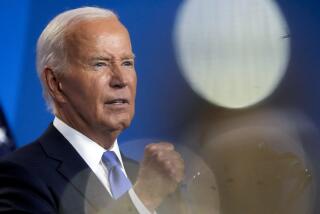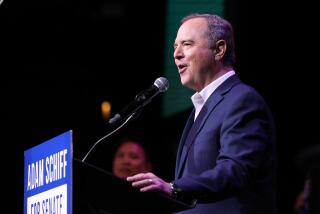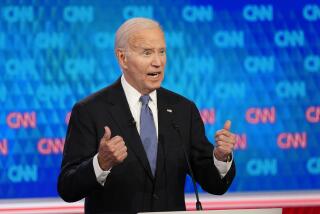He’s Running Under Pressure in His Home State : It’s All or Nothing for Simon in Illinois
- Share via
CHICAGO — Democratic presidential aspirant Sen. Paul Simon, whose droopy earlobes, large lips, horned-rimmed glasses and nerdy bow tie disqualify him as a blow-dried and tailored Hollywood stereotype politician, is telling the party faithful in Illinois: “I want your vote in the beauty contest, if you can believe it.”
Good for a nervous laugh, the line masks the urgency of Simon’s plea.
The popular veteran politician, who has won none of the 26 presidential primaries or caucuses held so far, is looking to the voters of his home state to begin healing his wounded presidential campaign.
Simon’s White House hopes, his Senate seat and the influence of the Illinois Democratic Party on the national nominating convention in July all rest on the results of Tuesday’s primary.
To remain a viable candidate, Simon says he must win both the non-binding presidential preference vote, or beauty contest, and most of the 113 convention delegates on a second ballot, who are pledged to specific candidates. The state Democratic Party will award candidates another 60 delegates in proportion to the delegate strength polled in Tuesday’s balloting.
Supporters Worried
“Simon’s out of it completely if he doesn’t win here, and his Senate seat--his race for reelection--may be damaged if he loses badly enough,” said University of Chicago political scientist Gary Orfield, affirming what many close to Simon were saying off the record. Orfield, who is running as a convention delegate pledged to Simon, added: “A lot of his supporters are worried.”
“He’s in trouble if he doesn’t win the popular vote,” said a veteran party leader who spoke on the condition that he not be identified. “And the reports we’re getting are that Paul’s support has slipped. If he slips too much, a lot of us might not go to Atlanta.”
There is a perception here that sending party activists to the national convention in Atlanta is a major reason Simon remains a presidential contender.
He all but threw in the towel last month after a poor showing in New Hampshire, but returned to the campaign circuit with an under-financed, sometimes listless effort in the Midwest after a rather stormy session with Democratic powers in Illinois.
Pressured to Stay In
“We told him: ‘Look, you s.o.b., you got all of us to sign up as your delegates and you’re not going to abandon us now,’ ” said one Democratic leader who was involved in pressuring Simon to remain in the race through the Illinois primary.
The Democrats running as Simon delegates in the state’s 22 congressional districts range from party precinct captains and labor union officials to state legislators and city councilmen. They represent a large chunk of the party’s activists, so a loss could leave the state’s convention delegation in the hands of outsiders who are running as delegates pledged to other candidates.
Democratic officials leaned on a reluctant Simon to remain in the race also because they hope that a strong showing on Tuesday will give them the clout at the convention to influence a number of decisions, ranging from the choice of the presidential nominee in the event of a deadlocked, brokered convention, to shaping the Democratic platform.
“A lot of these people are running for local offices in November, and playing an active role at the convention gives them a publicity edge back home,” one state party leader said.
Sees Convention Deadlock
Simon said last week that he is in the race because he expects a deadlocked convention that will eventually turn to him, either to be the nominee or to help determine who the party’s standard-bearer will be.
Until last week, it had appeared that Simon would be the clear winner in Illinois. A Chicago Tribune poll taken after the New Hampshire primary projected Simon taking 43% of the Democratic vote and the Rev. Jesse Jackson picking up 25%. The Tribune reported in today’s editions, however, that Simon’s support had slipped to 35% last Thursday and Jackson’s had increased to 30%. Massachusetts Gov. Michael S. Dukakis rated 18%, and Tennessee Sen. Albert Gore Jr. and Missouri Rep. Richard A. Gephardt split about 10%.
The poll was completed just as Dukakis, fresh from his strong showing in the Super Tuesday contests, was mounting a $500,000 campaign to win delegates and popular votes in Illinois.
Simon’s effort may have been hurt even more when the state’s two largest newspapers endorsed others today. The Chicago Sun-Times gave its support to Dukakis and the Tribune endorsed Gore.
Paying Off Debts
Campaign sources also said that Simon, whose personal frugality is legendary in Illinois, is under pressure from big contributors not to run up any new debt. In fact, his campaign has spent the last two weeks repaying bank loans and, by Tuesday, will owe money only to vendors and people hired under contract.
“There is a perception out there now that he isn’t a serious candidate,” said David Orr, a Chicago city councilman and former acting mayor who also is running as a convention delegate pledged to support Simon. “I detect a softening of his support.”
That softening is giving rise to speculation among Democratic Party leaders about its impact on Simon’s chances for reelection to a second Senate term in 1990.
A particularly strong showing for Jackson, one party leader said, might lead to the civil rights leader challenging Simon in the Democratic primary of that year. There also is speculation among party leaders that Philip J. Rock, the Illinois Senate president who lost to Simon in the last primary, might run against Simon. Rock, in an interview, said little to defuse such speculation.
Democratic Party leaders also were speculating that Republican Rep. Lynn Martin will challenge Simon in 1990.
“I’m not one to constantly look over my shoulder,” Simon said. “You do what you think is right.” He noted that running for the presidency did not stop Democrats John Glenn of Ohio, Lloyd Bentsen of Texas or Alan Cranston of California from being reelected to the Senate.
More to Read
Sign up for Essential California
The most important California stories and recommendations in your inbox every morning.
You may occasionally receive promotional content from the Los Angeles Times.













